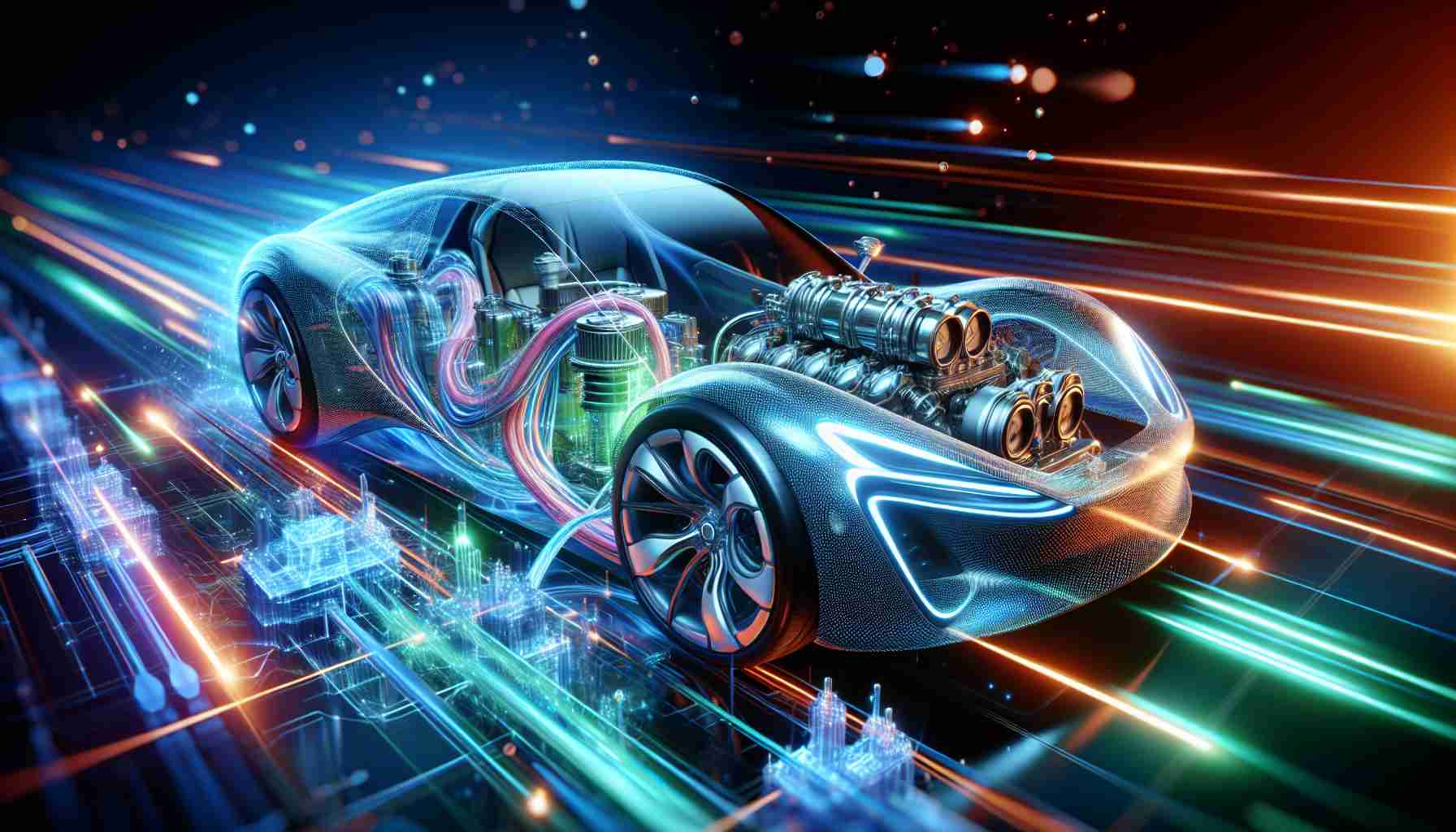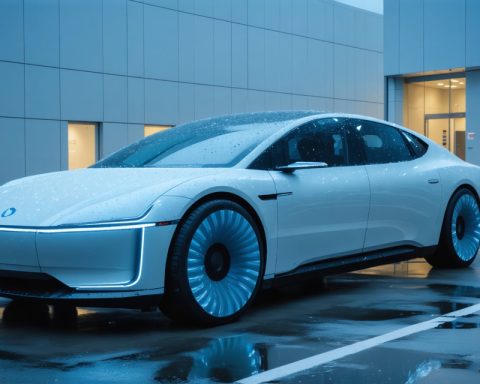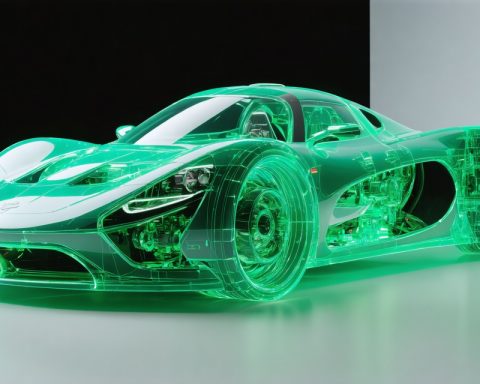A New Era in Automotive Technology
Hydrogen-powered vehicles are taking the automotive industry by storm. In Europe, commercial applications are showcasing the potential of internal combustion hydrogen engines, with many global automakers filing patents for similar technologies aimed at both commercial and performance sectors. These engines operate similarly to traditional gas or diesel engines, mixing air and hydrogen fuel to generate power.
Cummins has unveiled a cutting-edge turbocharger designed specifically for hydrogen engines, known as the CCS H2 ICE. This innovative turbocharger features a variable geometry system that optimizes performance for the unique characteristics of hydrogen. Although details remain limited, its aerodynamic design is tailored to the lower density of hydrogen compared to conventional fuels. Importantly, when hydrogen burns, it produces water as a by-product, and this turbo is engineered to manage that water seamlessly to enhance performance and durability.
In Europe, hydrogen combustion engines are celebrated for their zero-emission status, aligning perfectly with the rigorous Euro VII regulations. Currently, these advanced turbocharged hydrogen technologies are primarily found in commercial vehicles, but the potential for high-performance hydrogen supercars from brands like Ferrari is on the horizon.
However, a significant challenge remains: the infrastructure to support hydrogen fueling is complex and requires specialized equipment. While hydrogen is safer than gasoline in some aspects, its transport and storage demand heightened attention. Cummins has yet to disclose when their revolutionary turbo will hit the market.
The Broader Implications of Hydrogen-Powered Vehicles
As hydrogen-powered vehicles gain traction, their impact extends beyond the realm of automotive innovation into the fabric of society and the global economy. The adoption of hydrogen technology has the potential to catalyze a significant shift in energy consumption patterns, significantly influencing both local and global markets. This transition could reduce reliance on traditional fossil fuels, driving demand for hydrogen production and distribution infrastructure.
Furthermore, hydrogen’s role in achieving net-zero emissions aligns with growing global commitments to combat climate change. With governments advocating for cleaner energy solutions, jurisdictions investing in hydrogen infrastructure could spur job creation in sectors ranging from engineering to renewable energy development. This could create a ripple effect, encouraging more research and development in sustainable technologies and driving innovation in related fields.
From an environmental perspective, transitioning to hydrogen could significantly reduce pollutants associated with conventional fuels. However, the production of hydrogen itself poses challenges; if derived from fossil fuels, it risks perpetuating some environmental issues. As society emphasizes sustainable practices, the focus must enhance green hydrogen production—using renewable energy sources like wind and solar power—which could lead to long-term improvements in both air quality and energy resilience.
In terms of future trends, the trajectory of hydrogen vehicles suggests a transformative potential that could redefine personal and public transportation. As manufacturers like Cummins develop specialized technologies, we are on the brink of a new age in mobility that emphasizes efficiency, performance, and environmental stewardship. The era of hydrogen fuel promises not only a new chapter in the automotive landscape but also a profound shift in our approach to energy consumption and environmental responsibility.
Hydrogen-Powered Vehicles: Shaping the Future of Automotive Innovation
The Rise of Hydrogen-Powered Vehicles
The automotive industry is increasingly turning its attention to hydrogen-powered vehicles, marking a noteworthy shift towards sustainable energy solutions. As the demand for eco-friendly transportation grows, hydrogen combustion engines have emerged as a promising alternative to traditional fossil fuel-powered vehicles. Global automakers are actively exploring hydrogen technology, with many filing patents for innovative solutions in both commercial and performance sectors.
Key Innovations in Hydrogen Technology
One of the standout advancements is Cummins’ newly introduced turbocharger, specifically designed for hydrogen engines, dubbed the CCS H2 ICE. This high-performance turbocharger features a variable geometry system that optimizes the combustion process for hydrogen’s unique properties. Its design addresses the challenges presented by hydrogen’s lower density compared to conventional fuels, ensuring enhanced efficiency and performance. Furthermore, the combustion of hydrogen produces only water vapor as a by-product, making it a remarkably clean energy source.
Regulatory Backing and Market Trends
The increasing adoption of hydrogen technology in Europe aligns with the stringent Euro VII regulations, which emphasize zero-emission standards. This regulatory landscape supports the development of hydrogen combustion engines, primarily focusing on commercial applications at present. However, the potential for high-performance applications, such as hydrogen-powered supercars from luxury brands like Ferrari, illustrates the broad appeal of this innovative technology.
Challenges and Limitations of Hydrogen Infrastructure
Despite the advancements, several challenges remain, particularly concerning the necessary infrastructure for hydrogen fueling. The complexities involved in hydrogen production, storage, and transport demand significant investment and development. While hydrogen is considered safer than gasoline in certain scenarios, ensuring a comprehensive fueling network is critical for widespread adoption.
Future Predictions and Use Cases
Looking ahead, the integration of hydrogen vehicles into the consumer market may soon gain traction, bolstered by advancements in technology and investment in infrastructure. Various sectors, including public transport and freight, stand to benefit immensely from hydrogen fuel cells due to their efficiency and environmental benefits.
Conclusion
As the automotive industry navigates this new era of hydrogen technology, the aligned efforts of automakers, regulators, and infrastructure developers are crucial for overcoming the current challenges. With continued innovation and a commitment to sustainable practices, hydrogen-powered vehicles could redefine transportation in the years to come.
For further insights into automotive trends and technologies, visit automotive.com.
















